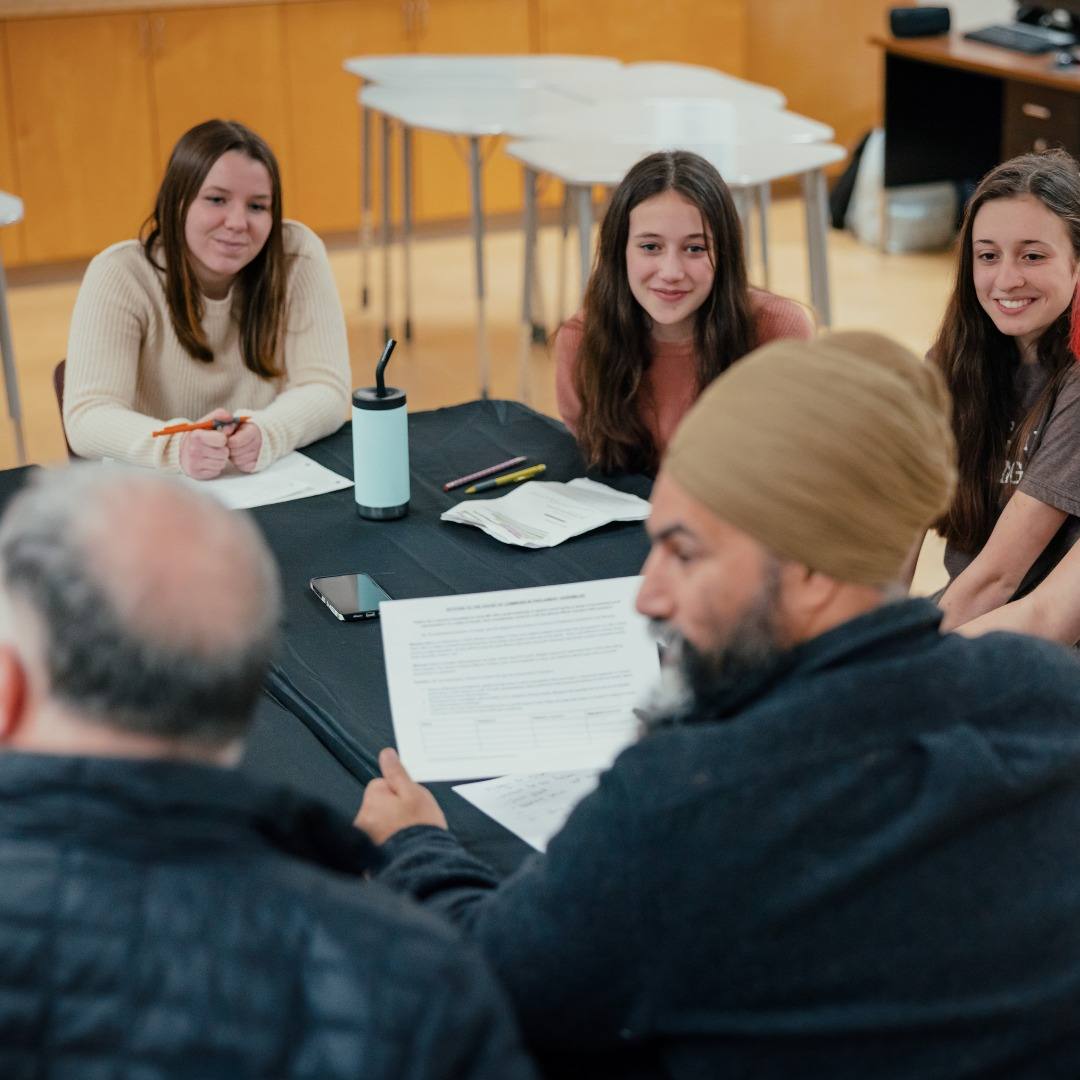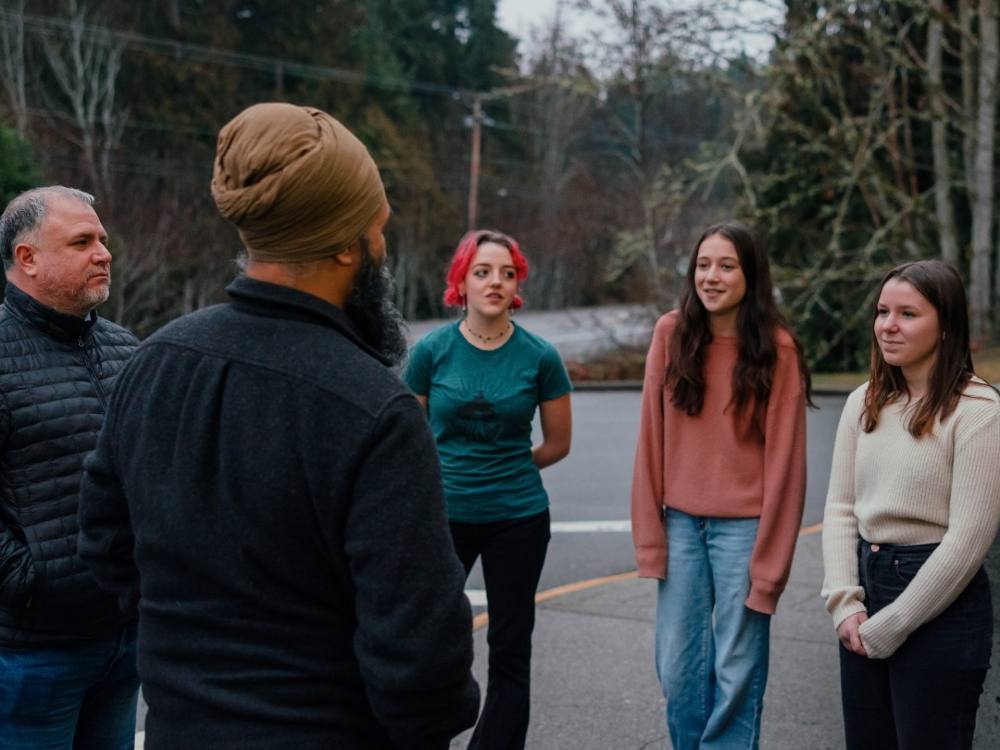Just because young people can’t vote doesn’t mean they shouldn’t get a voice in Parliament, according to an environmental youth organization on Vancouver Island.
That’s why the Qualicum Beach branch of Fridays for the Future, a global youth climate activist movement, is calling on federal politicians to consult with youth in their riding before voting on any bill affecting greenhouse gas emissions.
They’re making this request through a petition that closed March 26. Even before the online petition closed the group had enough physical signatures to have their local NDP MP Gord Johns table the petition in Parliament.
Teegan Walshe, who is 15 years old and in Grade 10, and Sierra Foster, who is 13 years old and in Grade 8, told The Tyee they know this petition won’t solve the climate crisis but it will ensure younger voices are considered in Ottawa.
“I’m only 15 but I’ve noticed a lot of the effects of climate change that scientists were first predicting a long time ago, like the increased frequency and severity of extreme weather,” Walshe says.
“CO2 concentrations have increased drastically since 2007 when I was born,” she adds, noting this motivates her to act and try and steer towards a better future.
Foster also says the existential threat of climate change fuels her.
“Learning about climate change and how urgent it is, it got really hard to know how to deal with it. It’s pretty scary,” she says. “We need to take action.”
The pair, alongside their classmates involved with Fridays for the Future, are also striking from school every Friday from 8:30 a.m. to 3 p.m. as part of the global strike involving 14 million youth worldwide. Walshe and Foster say their Qualicum chapter has been on strike for 80 weeks. They spend Fridays at their city hall working to raise awareness about the climate crisis with their presence.
That’s drawn some community negativity, they say. But it also got them on the radar of their local MP Johns.
And so when NDP Party Leader Jagmeet Singh visited Johns’ riding and asked who would be important to meet, Johns brought him to the young people camping out at town hall demanding political change.
Walshe and Foster say they’d already created the petition by the time they met with the politicians “in order to have a concrete action to bring forward in those conversations.”

“Right now big decisions are being made for young people and they don’t get to give their feedback on decisions made today about the world they’ll inherit,” Johns told The Tyee.
It’s important for youth to have a voice in politics for several reasons, he says.
First, young people are citizens too so what they want is important, he says.
“Look at the mess we’re in — they’ll inherit this,” he says, referring to the climate crisis. “We need to ensure they have a seat at the table.”
Second, Johns says young people are more informed than some people might think.
“I go to a lot of classrooms and most kids in Grade 10 are better informed about the issues of the day than the adults I meet on many doorsteps,” Johns says.
The older you get the easier it is to get caught up in your daily life and feel apathetic about larger issues, he says.
Third, the fossil fuel lobby is powerful and young people should be allowed to access and lobby their politicians too.
“Fossil fuel lobbying is extremely influential,” he says. “If politicians gave the same amount of access and consideration to young people we wouldn’t be seeing the same dangerous decisions being made.”
And finally, it would help ensure youth have a voice in Parliament, especially after the NDP’s private member bill to lower Canada’s voting age to 16 was defeated last September.
Being politically involved at a younger age means you’re more likely to vote in later elections, Johns says. So it’s important to include youth who want their voices heard today, which will avoid the next generation growing up apathetic to politics.
The petition was carefully worded so it could be accepted by all parties but still give youth a meaningful seat at the table, Walshe says.
“We had to start somewhere,” she says. “But this could lead to bigger things [like lowering the voting age] in the future. We needed something concrete that could be passed.”
The Tyee reached out to Canada’s party leaders to ask if they supported the petition or if there was a better way to ensure politicians consulted with youth.
Elizabeth May, leader of the Green Party and MP for Saanich-Gulf Islands, told The Tyee she supports the initiative but that the best way to bring justice against those who are “stealing the future” is to sue them.
Lawsuits are “intense and expensive” but we’re seeing more and more young people around the world turn to the courts for climate justice, she says.
That’s not to say petitions aren’t powerful — they were first used in the 1800s in the British Commonwealth to call for the abolition of slavery, May says. Look how that turned out.
It’s also important to not “put the burden on [youth] to avoid the collapse of human civilization,” May says.
Canadians of all ages need to push for their government “live up to its promises and climate change targets so they’re consistent with the UN’s Intergovernmental Panel on Climate Change’s reports,” she says. The IPCC is considered the world leader on climate change.
On March 20, the IPCC dropped what experts note will likely be its last major report before the world hits 1.5 C of warming above pre-industrial levels. Countries around the world, including Canada, signed the Paris Agreement in 2016 pledging to reduce their emissions from fossil fuels to avoid the planet warming by 1.5 C.
United Nations Secretary-General António Guterres said the report signalled that there should be “no new coal” and no gas-fired power plants, with the world shifting to be able to use carbon-free electricity by 2035, according to the CBC.
That has implications for B.C.
B.C. has coal deposits which are actively being mined and exported. It is also expanding its fossil gas infrastructure to be able to increase its fossil fuel exports.
The oil and gas industry and politicians have long claimed that exporting fossil gas to Asia will help reduce that continent’s coal use, without acknowledging how selling fossil fuels to a market to help it reduce its fossil fuel use is poor logic at best.
Canada and B.C. also do not count emissions generated by exported products, including fossil fuels, so governments can say they’re reducing emissions while building out fossil fuel infrastructure.
The Liberals and Conservatives did not reply to The Tyee’s interview request by press time. The NDP did not respond to The Tyee’s request for an interview with Jagmeet Singh. ![]()
Read more: Energy, Politics, Environment

















Tyee Commenting Guidelines
Comments that violate guidelines risk being deleted, and violations may result in a temporary or permanent user ban. Maintain the spirit of good conversation to stay in the discussion and be patient with moderators. Comments are reviewed regularly but not in real time.
Do:
Do not: